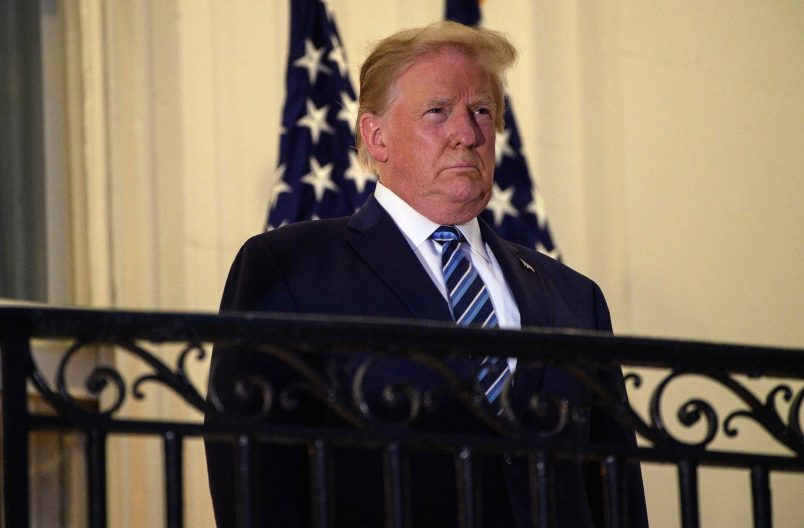This article is part of TPM Cafe, TPM’s home for opinion and news analysis.
When President Trump quipped in late September that there wouldn’t be “a transfer” of power, he was only adding to a long list of such refusals to commit to a peaceful transition. Most Republican office-holders at the time met this remark with their customary silence, continuing a troubling pattern of legitimation by quietude. After a handful did push back — including Senators Lindsey Graham, Mitt Romney and Marco Rubio — Trump and his staff revised the remarks; the President “will accept the results of a free and fair election,” White House Press Secretary Kayleigh McEnany said, before pivoting to attacks on Democrats.
Yet Trump’s walk-back, and Republican condemnation of it, was only partial. Trump himself, and other Republicans, suggested the election would end up before the Supreme Court; Lindsey Graham, for instance, said he would “accept the Court’s decision.” The problem here is that the Court has never certified presidential elections. All the Court did in Bush v. Gore was stop a recount in a pivotal state, reversing the judgment of a lower court. Once that recount stopped, the determination of Florida’s Secretary of State (remember Katherine Harris, anyone?) was final, and Vice President Al Gore didn’t have the Electoral College votes to prevail. The actual certification of Electoral College winners, meanwhile, happens in Congress, and there is no precedent for the Court telling Congress what to do at this point.
So why were Republicans talking about the Court? I think Trump’s remarks amount to a tell. So too with Majority Leader Mitch McConnell’s tweet that “the winner of the November 3rd election” will be inaugurated. These statements reveal three troubling realities.
First, some (not all) Republicans are prepared to try to delegitimize a slew of votes in different states, especially the large number that, because of the pandemic, will likely be counted after Nov. 3.
Second, these authoritarians (again, not all Republicans) want to then use state legislatures to substitute a slate of electors different from the one that would be chosen by a majority of the state’s voters.
Third, these authoritarians are hoping that the federal courts back either of these two strategies or both, by declaring that only the early tally of votes shall apply, or by backing state legislatures’ fiat. While a genuine electoral comeback by Trump is possible, TPM’s Josh Marshall is right to remind us that these moves come from the real specter of Trump losing state majorities and the Electoral College, combined with the dire legal situation that Trump and some of his allies might find themselves in once out of office.
Vigilance is a form of citizenship, and Democrats have to be clear about what the certainties are. The certainty is that some (authoritarian) Republicans are looking for an opening for state legislatures to substitute a pro-Trump slate of electors in a state in which Biden has won a majority of votes. (I have elsewhere called this “false population” of the Electoral College.) After state legislative replacement of popular vote’s slates, Republicans hope for ratification of this move by a pliant Supreme Court.
Biden’s recent improvement in the polls should not blind anyone to the need for democratic vigilance. First, nothing about the false population strategy requires that the state tally be a close one. And this strategy can of course be attempted in tandem with the kinds of voter suppression tactics that we know some Republicans are contemplating and implementing. Second, a Trump facing humiliation might be more likely, not less, to engage in these kinds of tactics. Vigilance by war-gaming is a complement to, not a substitute for, a full-press electoral strategy.
At the risk of repetition, let me state what should be clear to Democrats. If the state majorities tilt against him, Trump will try this, Barr is likely to go along, and some of his supporters will try to aid him in doing so. The question is whether other actors let him. Not just the courts, but responsible Republicans in Congress and state legislatures.
If a state legislature even tries to substitute an alternative slate of College electors for the slate that would be produced by a state majority, a decisive line will have been crossed in the history of the American republic. If false population then succeeds for any state, it is the end of a chapter in the American republic and perhaps the republic itself. I say “end of the republic” intentionally and without hyperbole, for the idea of majority rule, or “the republican principle,” was essential to James Madison’s idea of republican government. No modern government can claim to be a democratic republic and have incumbent politicians choosing the winner of a majoritarian contest in lieu of well-established popular vote aggregates under fair election administration.
Having state legislatures choose electors was one thing in the nineteenth century (South Carolina did it as late as 1868, Colorado as late as 1876). But having state legislatures do that today means reversing both millions of existing votes and going back on more than a century of stable and institutionalized practice that Americans have rightly come to expect. And once modern-day state legislatures take away power from voters once, it would be a quick step for them to wrest that power from voters for all time. (Indeed, an important constitutional argument could be made that were a state legislature, having extended the power to appoint electors to voters and having set up an administrative machinery to do so, to substitute its own elector slate for that of the voters, the process and the result would violate the Constitution’s clause requiring the federal government to guarantee to each state a republican form of government.)
Were state legislatures to take this historic step, there would be a number of constitutional questions to sort out. The first is how state legislatures would be “taking back” that power from voters: would it be a resolution of the legislature or a bill passed by the legislature and signed by the governor? The argument for resolution is that Article II mentions “the state legislature” and it alone in the Elections clause. The argument for statute is that state legislatures used statutes to establish a process for popular vote determination and all of the various statutes regulating that process. If governors had to assent to those original statutes — now hundreds of years’ worth — it seems illogical to say that they should be allowed no role in their reversal. (One might then wonder whether those earlier statutes were somehow unconstitutional, involving as they did the assent of actors other than the state legislature.) In the larger sense, allowing the state legislature to choose without the action of the governor would also betray the separated powers principles of the republican form of government, whose oldest document, the Massachusetts Constitution of 1780, founded the modern veto power.
A second question is whether state legislative fiat would violate the Equal Protection Clause. As Americans saw in the Supreme Court’s critical decisions in Williams v. Rhodes (1968) and Oregon v. Mitchell (1970), the supremely independent state legislature is not one that can act in ways that violate equal protection and due process requirements of the Fourteenth Amendment. This point becomes all the more powerful if in fact state legislatures try to install their own slates after the election has started or voting has concluded, and not before.
So, the Court may weigh in. But I would not rule out the possibility that if it weighed in aggressively to ratify one or more state legislative fiats to falsely populate the Electoral College, Congress might refuse to certify the outcome. The end result, as others have noted, is that the Speaker of the House becomes President, and that person is likely to be Nancy Pelosi. Or as I have written elsewhere, and as former Indiana Congressman Lee Hamilton (D), former Maine Senator William Cohen (R) and National Academy of Public Administration fellow Alton Frye have written, an aggressive congressional majority could use its autonomous seating power under Article I, Section 5, to set things right, either by altering the contingent vote if there is a non-resolved Electoral College, or perhaps by producing a temporary supermajority to impeach and convict the President.
And that leads me to conclude with a note on Speaker Pelosi. The People’s Speaker needs to get serious (or communicate that she is serious) about the end game. She recently sent around a “Dear Colleague” letter remarking that Democrats needed to pick up seats, just in case the Electoral College was unresolved by states failing to report their electors. This followed a brief mention of the contingent vote possibility by Trump himself. The point is that the contingent vote under the Twelfth Amendment aggregates a majority of delegations, not of members, and that in the current house (and possibly the next), Republicans have that delegation majority, not Democrats.
I’ve already written (here and here) that if the election is illegitimately thrown to the House — a scenario not of “false population” but of “underpopulation” of the Electoral College — Pelosi could take bold action to reverse that move by using the House’s constitutional authority to judge the qualifications and elections of its members. This action would be entirely appropriate given that the Twelfth Amendment is intended for a more-than-two-candidate world (as in 1800 or 1824) or exact Electoral College-tie scenario, not for deliberate and undemocratic underpopulation of the College. As nuclear as that might sound, 19th century majorities manipulated delegations all the time, and former Rep. Hamilton and former Sen. Cohen have already called for the Congress to use its autonomous seating power to reject gerrymandered delegations.
I’m assuming that Pelosi’s letter was a fund-raising thing, as Dear Colleague letters often are. But I sincerely hope that she isn’t planning on capitulating if a state or two withholds its Electoral College slate and a contingent vote is triggered. Such a move on her part would be deeply irresponsible and entirely inconsistent with the spirit of the Twelfth Amendment. If the states illegitimately send the election to the House and a contingent vote, she needs to communicate that she will use her constitutional powers to rectify the matter. It’s a case where two wrongs would set a matter aright.
I don’t think anyone wants the process to end this way. I certainly don’t. The question becomes whether it’s the lesser of many possible evils. We might be in real trouble if Congress stepped in to reject a Court-sanctioned hijacking of the popular vote by state Republican legislatures. But we (and for that matter, the Supreme Court) might be in worse trouble were Congress not to step in. For one, it would establish the precedent of the Supreme Court attempting to decide the election, which has in a de jure sense never happened. Not in 1800, not in 1824, not in 1876 and, no, not in 2000. For another, were it to succeed in deciding the election by legitimating state legislative fiat, the Court would establish itself decisively as a cluster of partisans in robes. The republican principle in the states would be violated openly, decisively and precedentially. And our democratic republic would come to an end.
Daniel Carpenter is Allie S. Freed Professor of Government in the Faculty of Arts and Sciences at Harvard University. Professor Carpenter graduated from Georgetown University in 1989 with distinction in Honors Government and received his doctorate in political science from the University of Chicago in 1996. He taught previously at Princeton University (1995-1998) and the University of Michigan (1998-2002). He joined the Harvard University faculty in 2002. From 2013 to 2020, he served as Faculty Director of the Social Sciences at the Radcliffe Institute for Advanced Study. He is the author of the forthcoming book Democracy by Petition: Popular Politics in Transformation, 1790-1870 (Harvard University Press, 2021).










Wildly hypothetical nonsense for the most part.
If you want a Democracy then VOTE! VOTE VOTE
And egregious attempts to somehow preemptively blame Pelosi for whatever does go wrong by supposing she’d capitulate in a way that hands Trump the election. I’m fairly certain that whatever legal issues arise from the election will be fought by the literal hundreds of attorneys Biden has on the case and not the Speaker of the House.
I’m comfortable that Madam Speaker will do whatever is necessary when Trump, Barr and the others try their end run.
And after yesterdays odd reversal of a stimulus package it’s becoming clearer that tRump not only knows he’s going to lose…he’s willing to hold Americans livelihoods and well being hostage unless they vote for him.
Meanwhile, over at WAPO…
Trump blows up stimulus talks, and with them perhaps his chances of reelection